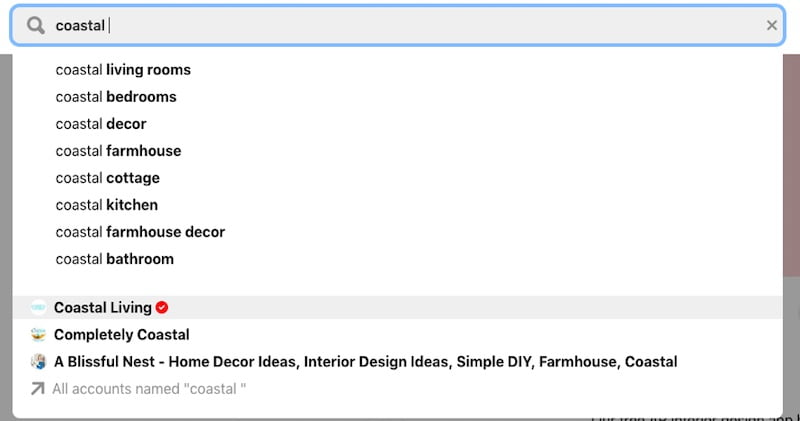Too often, ecommerce companies consider Pinterest only as social media. But Pinterest is primarily a discovery engine with visual search. It has more in common with Google than, say, Instagram.
Merchants should therefore carefully optimize keywords when creating pins to entice clicks and visits. In this post, I’ll offer tips for optimizing Pinterest titles and descriptions.
Pinterest SEO
Pinterest’s algorithms read a pin to determine its distribution in search, related pins, and in Pinners’ feeds. The process, collectively, is Pinterest search engine optimization. It can send a heaping supply of quality leads to an ecommerce site.
Begin by researching Pinterest keywords. I’m not aware of a tool for expediting such research. A simple solution is to type a search query on Pinterest and let the auto-suggest keywords provide ideas. The words and phrases that appear are popular search terms.
In the screenshot below, “coastal” appears in the search bar. Below it are multiple words and phrases that work best on Pinterest. Target these two- to three-word phrases, as single-word terms are often highly competitive.
The auto-suggest words and phrases from Pinterest search queries are typically the best for optimizing titles and descriptions.
In Google, the auto-suggest results for a consumer searching on “wicker chairs” are mainly items for sale.
Google’s auto-suggest results for “wicker chairs” are mainly items for sale.
Pinterest users are typically starting the buying process. They are mainly looking for inspiration. Thus the auto-suggest results for “wicker chairs” on Pinterest are mostly ideas.
Pinterest users are mainly looking for inspiration. Thus the auto-suggest results for “wicker chairs” are mostly ideas, not products for sale.
Once you have identified keywords, create and optimize your pin.
Titles
Titles of pins go beyond impacting Pinterest’s algorithm. Pinners scan those titles for relevant info. A pin title can have up to 100 characters. Only about the first 30 generally show on the feed, requiring a Pinner to click on the pin to see the full title. (Although there are exceptions as shown on the screenshot below.)
Thus, to be safe, place the keywords at the front of the title if they enhance the user experience and are not forced.
Consider the example feed below. There is a mixture of brands, ecommerce offerings, and blog posts. The title on the left (“New Dress Pink Pale Rose…”) is keyword-optimized but lacks a compelling reason to click, other than the beautiful photo. The title on the right (“I Write About Fashion…”) is a blog post headline, which is unclear to the Pinner. However, the middle title (“Our Favorite Sustainable School Supplies with Impact!…”) is much better. It is personable (“Our”), enticing (“Favorite,” “with Impact!”), and keyword-optimized (“Sustainable School Supplies”).
All three titles correctly use uppercase and lowercase characters, which typically increases clicks.
The three titles on this example feed are a mixture of brands, ecommerce offerings, and blog posts.
Descriptions
A pin’s description is an opportunity to add helpful information about a product or blog post, to entice the Pinner to click. Pinterest allows up to 500 characters in a description.
Descriptions are vital for Pinterest SEO, too. Thus use keywords and make sure they match the title. It’s never a good idea to overuse keywords or insert them unnaturally. Be thoughtful, helpful, and use complete sentences.
Remember, too, that descriptions on your ecommerce site impact Pinterest. Note the two chunks of text in the pin below for “Rose Pink Marble iPhone Case.” The text directly below the title is a description that Pinterest pulled from the seller’s site. Hence, make sure the descriptions on your website are optimized and well-written.
The text directly below the title is a description that Pinterest pulled from the seller’s site.
The pin’s description (above) is at the lower right. The description is a bit keyword-stuffed and wordy. However, it uses nearly all of the allowable characters to describe the product and its uses. It ends with a clear call-to-action (“Shop now at Cases A La Mode!”) and includes three keyword-optimized hashtags, which help surface newer content.
Profile Name and Bio
Pinterest provides ample space for your business name and an optional keyword.
The profile page for Love My Dress, below, includes a keyword phrase (“Wedding Inspiration”) that is both a popular search term and an accurate summary of the business.
Love My Dress’s keyword phrase (“Wedding Inspiration”) is a popular search term and an accurate summary of the business.
Pinterest allows 160 characters for a profile description. Use them wisely to sell your brand. Be concise and mission-focused, such as the example below from The Sock Drawer. Its description describes the products and mission in one clear, concise sentence (“We happily curate and sell fun novelty socks for women, men, and kids from the best brands!”). The call-to-action (“Visit our boutique in San Luis Obispo or our popular online store.”) is direct and to-the-point.
The description on The Sock Drawer’s profile page describes the products and mission in one clear, concise sentence. The call-to-action is direct and to-the-point.

